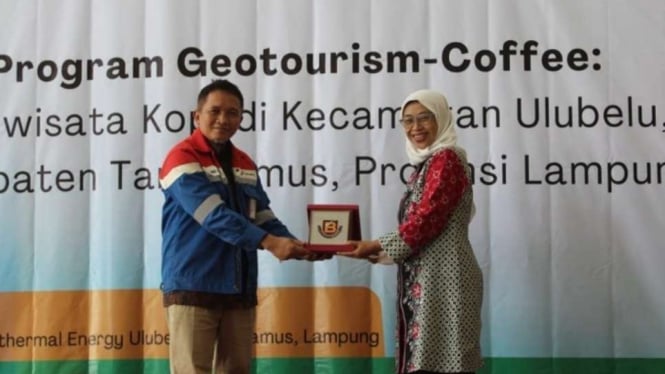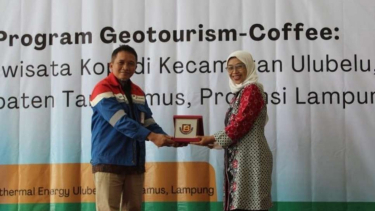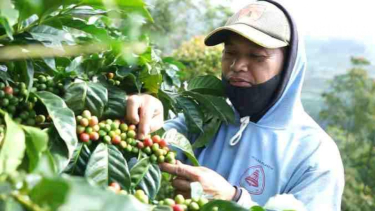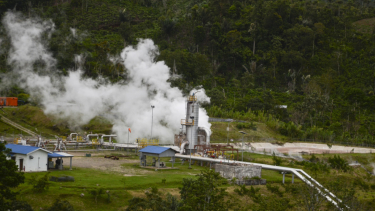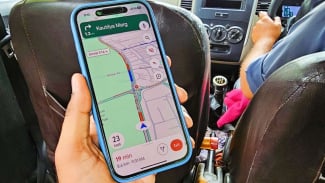PGE and Bakrie University Explore Geotourism-Coffee Potentials
- Dok. Pertamina
VIVA – PT Pertamina Geothermal Energy (PGE), part of Pertamina New & Renewable Energy, prioritizes social and environmental aspects, one is community empowerment by optimizing the potential of coffee plants around the operating area through the Coffee Learning House and Geotourism-coffee programs.
The Coffee Learning House and Geotourism-Coffee program is carried out by PGE Ulubelu Area, in Tanggamus Regency, Lampung Province, which is intended to improve the economy of coffee farmers.
General Manager of PGE Ulubelu Area, Andi Joko Nugroho, stated that PGE not only focuses on improving the economy of coffee farmers in Ulubelu but also educates coffee farmers to care about the environment Farmers must also be aware and care about the environment, so their agricultural activities can continue well.
"In collaboration with the Farmers Group Association (Gapoktan), we created the Rumah Belajar Kopi program in Pekon Sukamaju Ulubelu. The goal is to increase the capacity of coffee farmers, so the quality of coffee is produced and the selling price increases," Andi Joko said in a statement to the media on Tuesday, November 22, 2022.
Petani setempat memetik kopi Arabika Windusari saat panen
- vstory
According to Andi, coffee farmers should focus on quality, not just quantity. That way the volume of coffee planting in protected forests can be reduced.
Based on Social Mapping 2019 data from Gadjah Mada University, 83.33 percent of Ulubelu residents work as coffee farmers. From this data, it is known that not a few coffee farmers plant coffee in protected forests.
In overcoming this, together with the Kopi Beloe fostered partner group and Agung Utara City (KPHL) and two Ulubelu Gapoktan, it was agreed to carry out environmental and sustainable coffee farming with shade planting activities for coffee farmers.
Not only that, but PGE Ulubelu Area also collaborates with Bakrie University Jakarta in the Kedaireka Kemendikbudristek Matching Fund program in developing the potential of geothermal-based tourism and coffee plantations through the Geotourism-Coffee program, at the Head Office in Ulu district, Belu, Tanggamus.
Andi explained that the Geotourism-Coffe program consists of training to increase the capacity of tourism village organizations through various training and mentoring, pioneering the establishment of the Coffee Geotourism Lab as a center for information and education about geothermal energy.
Chairperson of the Kedaireka 2022 Matching Fund, Eli Jamilah, said that this year Bakrie University and PGE will create a branding strategy for Ulubelu destinations with superior coffee and geothermal tourism commodities.
"We hope that the Geotourism-Coffee activity can produce, namely mapping the potential of tourism programs and products, optimizing the capabilities of tourism village groups, and coffee farmers," Eli Jamilah remarked.
Ilustrasi sumur PGE.
- VIVA.co.id/Ikhwan Yanuar
In running its business, PGE continues to be committed to geothermal development and ensures the implementation of Environment, Social, and Governance (ESG) becomes an integrated part of PGE's geothermal business.
The implementation of these ESG aspects is an effort to provide added value as well as PGE's support for government programs related to the use of environmentally friendly renewable energy, especially geothermal.
PGE currently manages 13 Geothermal Working Areas (WKP) with an installed capacity of +1.8GW. A total of 672 MW is operated and managed directly by PGE, including Ulubelu - Lampung with an installed capacity of 220 MW, and 1,205 MW is managed under a Joint Operation Contract scenario.
The installed geothermal capacity in PGE's working area contributes 82 percent of the total installed geothermal capacity in Indonesia, with the potential to reduce CO2 emissions by approximately 9.7 million tons of CO2 per year.


